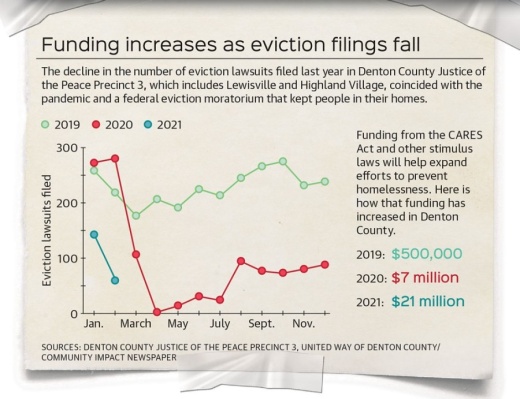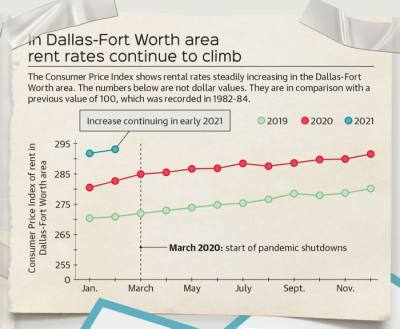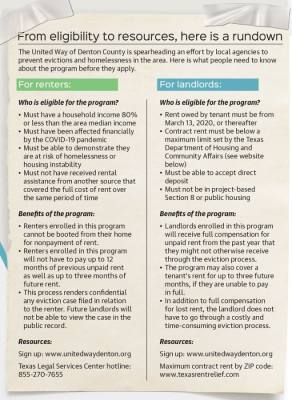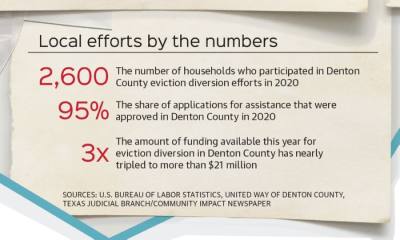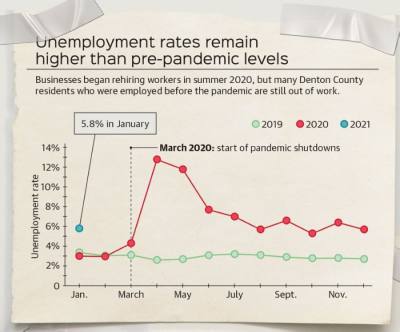Steward’s mother, with whom she lived at the time in Dallas, has a medical condition that heightens her risk of contracting a severe case of COVID-19.
In June, Steward quit her job. As months stretched on, Steward was unable to cover her basic expenses and had to move, she said. But in January, with help from Denton County’s Eviction Diversion Program, Steward, age 22, was able to settle into a new apartment in Lewisville.
“It took a lot of stress off,” Steward said of the program. “I didn’t know how I was going to pay my rent.”
This eviction diversion program is a collaboration between the United Way of Denton County and other agencies and is funded by federal stimulus money. The program aims to prevent homelessness during the pandemic by helping tenants to stay in their homes and compensating landlords for unpaid rent.
The program assisted 2,600 Denton County households last year, according to the United Way of Denton County, and the program’s resources are growing. More than $21 million has been set aside for rent assistance programs in the county this year, said Elena Lusk, director of housing initiatives for United Way of Denton County.
Evictions during a pandemic
The Lewisville area saw a decline in eviction lawsuits filed in 2020 during the pandemic compared with the previous year.
From March 2020 through February 2021, the number of eviction lawsuits filed in Denton County’s Justice of the Peace Precinct 3—which includes Lewisville and Highland Village—declined 72% as compared with that of the previous year. Fewer than 800 cases were filed in that time, down from the 2,812 filed during the previous 12 months.
A number of factors could have contributed to this drop, according to organizers.
For one, the federal government has placed a moratorium on evictions, which means that landlords can file lawsuits against their tenants but cannot evict them for unpaid rent. In late March, that federal moratorium was extended through June 30. But it applies only to landlords, not to the courts, according to guidance from the Texas Justice Court Training Center. A separate order from the Texas Supreme Court that paused evictions in the state did not get extended. That means eviction cases can once again move forward in the courts.
The expansion of unemployment benefits through federal stimulus programs may have softened the financial blow for many who lost their jobs.
But even as fewer landlords filed eviction lawsuits in the courts, an increase in need was apparent to local charity organizations, such as Christian Community Action. The Lewisville nonprofit is among the agencies working with United Way of Denton County to administer the eviction diversion program.
“We’ve had a tremendous increase in new clients that have not been to CCA before,” Director of Programs Daphne Adams said.
Not every landlord considering eviction is interested in participating in the program, but for most, it is a way of recouping up to a year’s worth of lost rent, Lusk said.
The loss of rent is reaching a critical point for some landlords, according to Jason Simon, director of government affairs with the Apartment Association of Greater Dallas, which covers 11 counties, including Denton County.
“Eviction is a last resort for us,” he said. “But at the same time, when the rent is not being paid, it’s been particularly devastating for our smaller landlord members.”
A focus on the courts
In February, programs similar to Denton County’s homelessness prevention efforts began rolling out across the state of Texas, bolstered by funding made available through the latest federal stimulus law.
The county’s current program can cover up to 12 months of back rent for tenants who make less than 80% of the median income in their area and who have been affected financially by COVID-19. It can also cover up to three months of future rent for those who qualify.
Some local agencies are now working closely with local courts to spread the word about the diversion program, Lusk said.
Precinct 3 Judge James Kerbow said all landlords and tenants going through the eviction process in his court are now informed of their options for rental assistance as an alternative to eviction.
The landlord and the tenant both have to agree to go through the program. If they do, the eviction case is made confidential, and they are referred to one of many local organizations, such as United Way of Denton County.
“Any time there’s something new—and this just happens in life—sometimes, there are some initial apprehensions,” Kerbow said. “People don’t yet know enough about it, so the court has been trying to provide as much information as possible.”
Liesbeth Powers contributed to this report.



